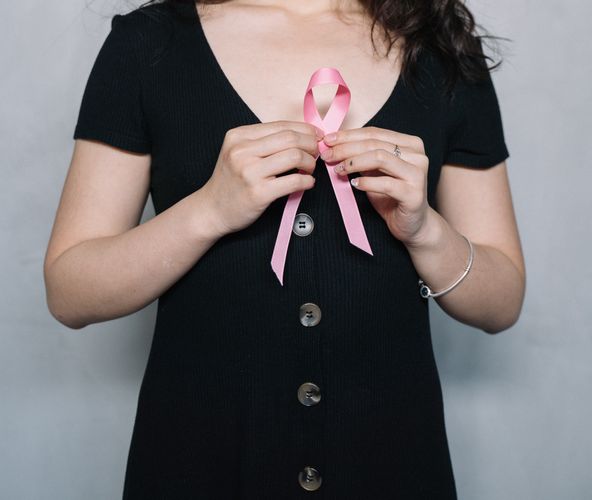Did you know that hypnotherapy can be a beneficial option for managing symptoms experienced with breast cancer and treatment? Want to know how?
In this article, we'll be exploring the answer to this question, discuss how hypnotherapy works for breast cancer, so you're prepared to make a decision on whether hypnotherapy will be effective as a supportive treatment option as you go through the process of treating breast cancer.
How Hypnotherapy Works for Breast Cancer
Hypnotherapy works for breast cancer and is used with breast cancer for many different reasons according to this study - all the reasons aim to improve the experiences breast cancer patients have from symptoms such as:
-
Distress
-
Pain
-
Nausea
This is what is called symptom-specific suggestions during a hypnotherapy session.
Here are examples of what symptom specific hypnotherapy for breast cancer may look like in different settings:
-
Breast cancer radiotherapy setting: Suggestions during a hypnotherapy session are made about reducing three symptoms skin toxicity, distress, and fatigue.
-
Breast cancer surgical setting: Suggestions during a hypnotherapy session are made about minimizing three symptoms postsurgical pain, fatigue, and nausea.
During symptom-specific hypnotherapy sessions, the suggestions and scripts are often customized to each individual person. Often because direct suggestions are used, the type of hypnotherapy that breast cancer and patients of other forms of cancer often experience is called suggestion hypnotherapy. In these hypnotherapy sessions for breast cancer patients - no matter if it is for radiology, surgery, chemotherapy, or another treatment. A hypnotherapist aims to help the cancer patient by suggesting that the breast cancer will experience less of a symptom and suggest either that the patient is either:
-
Distracted from noticing the symptom
-
Experience an alternative feeling and sensation in place of the symptom in question.
Wondering how breast cancer patients can experience these benefits and more when there is not a hypnotherapist around?
Self-Hypnosis and Breast Cancer
Self-hypnosis for breast cancer can play a vital role in aiding breast cancer patients in management and handling the symptoms, emotions, and different levels of distress that can be experienced throughout a battle with breast cancer.
It can also be used in all same situations mentioned above - for breast cancer surgeries, radiotherapy, and symptoms of nausea, pain... and so much more.
The important thing here is to make sure that the hypnotherapist that you work with has both a background of working with cancer or breast cancer patients and also teaches self-hypnosis.
These two things are important because they will ensure that the hypnotherapist will have the knowledge and experience to write hypnotherapy scripts that are geared toward your needs for breast cancer. It also ensures that you are working with a hypnotherapist that will help you build the skills and tools you need to continue to help yourself on your battle with breast cancer both outside of hypnotherapy sessions and when hypnotherapy has ended.
How Many Hypnotherapy Sessions are Required for Breast Cancer?
The number of hypnotherapy sessions that are needed and required for breast cancer patients is dependent on three different factors:
-
Individuality: Each person is different. Each individual has a different personality.
-
Battle: The breast cancer battle that is fought is different for each person diagnosed with breast cancer. This is because of two elements - the stage of cancer at the time of diagnosis and the order of treatment options needed as well as chosen.
-
Needs: Although symptoms can be similar, no two people have the same experience or needs that need to be supported through a battle with breast cancer. This can include physical, emotional and mental needs.
Depending on how these three factors influence a breast cancer patient, the number of hypnotherapy sessions required can range from a single session to more than three months of weekly sessions.
According to a study, the one time sessions may be used when a person elects for pain medication and hypnosis during surgery for breast cancer or general anesthesia.
How Hypnotherapy can Help with Hot Flashes Associated with Breast Cancer
Hot flashes are a challenge that is experienced by many breast cancer survivors, and can lead to the following experiences and symptoms:
-
Decreased quality of life
-
Anxiety
-
Discomfort
-
Issues with sleep
A study published in the Journal of Clinical Oncology set out to discover if hypnotherapy can be beneficial for breast cancer survivors who live with hot flashes.
5 Ways Hypnotherapy Helps with Hot Flashes Associated with Breast Cancer
From the study, the following was discovered:
-
Severity: Some Breast cancer survivors experience 14 or more hot flashes in a weekly basis.
-
Decrease: Hypnotherapy can help decrease the intensity level of hot flashes by 68%.
-
Improvement: Improvement also occurs in other aspects of life as hot flashes are reduced through hypnotherapy.
-
Quality: Sleep comes more easily and at a higher quality, and both anxiety and depression are experienced less.
-
Sessions: The number of hypnotherapy sessions needed to achieve this outcome is five sessions.
YouTube Videos: Hypnotherapy for Breast Cancer
Here are a few Youtube recommendations for hypnotherapy and breast cancer:
NZ Breast Cancer Symposium - Dr Holly Forester-Miller: Self-hypnosis (Dr. Holly Forester Miller stalks how hypnosis can enhance the quality of life of breast cancer patients.)
Hypnosis for Breast Cancer Recovery by Scarlet Watson Ms Ht
Books, Apps,and CDs on Hypnotherapy for Breast Cancer
Here are some recommended books, apps,and CDs on hypnotherapy for breast cancer:
-
Breast Cancer. How to Regain your Confidence trough Hypnosis. by Codore
-
Breast Cancer: Your Support Through Chemotherapy: Hypnotherapy to promote your emotional and physical wellbeing by Lynda Hudson (Original recording and Audible Book).
Complementary and Holistic Approaches to Supporting Breast Cancer Treatment
Other complementary medicine approaches to support breast cancer treatment include:
-
Homeopathy
-
Guided meditation
-
Tai Chi
-
Yoga therapy
-
Massage
More Information
Want more information on hypnotherapy? Check out these other resources:
References:
Carlson, L. E., Toivonen, K., Flynn, M., Piedalue, J. D., Tolsdorf, E., & Subnis, U. (2018, November 13). The Role of Hypnosis in Cancer Care. Retrieved January 9, 2019, from https://link.springer.com/article/10.1007/s11912-018-0739-1#citeas
Cramer, H., Lauche, R., Paul, A., Langhorst, J., Kummel, S., & Dobos, G. J. (2015). Hypnosis in Breast Cancer Care: A Systematic Review of Randomized Controlled Trials. Integrative Cancer Therapies, 5-15. Retrieved January 14, 2019, from https://journals.sagepub.com/doi/full/10.1177/1534735414550035?url_ver=Z39.88-2003&rfr_id=ori%3Arid%3Acrossref.org&rfr_dat=cr_pub%3Dpubmed#articleCitationDownloadContainer
Elkins, G., Marcus, J., Stearns, V., Perfect, M., Rajab, M. H., Ruud, C., Palamara, L., ... Keith, T. (2008). Randomized trial of a hypnosis intervention for treatment of hot flashes among breast cancer survivors. Journal of clinical oncology : official journal of the American Society of Clinical Oncology, 26(31), 5022-6. Retrieved January 14, ,2019 from https://www.ncbi.nlm.nih.gov/pmc/articles/PMC2652097/
Montgomery, G. H., Schnur, J. B., & Kravits, K. (2012). Hypnosis for cancer care: over 200 years young. CA: a cancer journal for clinicians, 63(1), 31-44. Retrieved January 8, 2019 from https://www.ncbi.nlm.nih.gov/pmc/articles/PMC3755455/
Wobst, A. H. (2007). Hypnosis and Surgery: Past, Present, and Future. Anesthesia & Analgesia, 104(5), 1199-1208. doi:10.1213/01.ane.0000260616.49050.6d. Retrieved January 16, 20,19 from https://www.ncbi.nlm.nih.gov/pubmed/27575449















